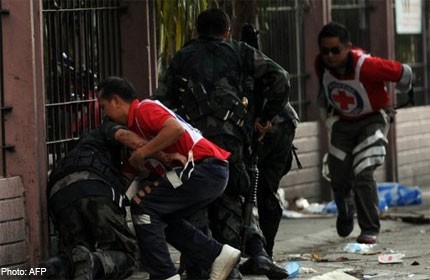Philippine troops clear rebels, cut off escape routes

ZAMBOANGA, Philippines - Philippine troops took back ground from Muslim rebels Sunday, the military said, as they tried to end a week-long siege in the southern city of Zamboanga that has seen thousands flee and left more than 60 people dead.
Sporadic clashes continued as soldiers moved to clear Moro National Liberation Front (MNLF) gunmen from coastal neighbourhoods and cut off escape routes after a ceasefire plan collapsed.
Military spokesman Lieutenant Colonel Ramon Zagala told AFP a number of MNLF rebels had surrendered Sunday, and some had been captured while trying to escape in civilian clothes.
"We are gaining ground. We've taken back some of the areas from them. We are still moving forward," he said.
As troops moved through the Santa Barbara district, the extent of the damage from seven days of fighting came into full view.
Several buildings were reduced to smouldering heaps while others were pockmarked with bullet holes, an AFP reporter said.
Soldiers recovered the bodies of two slain gunmen still clinging to their rifles, and several unexploded warheads for use in rocket propelled grenades had been left behind by the fleeing rebels.
In the distance, black smoke billowed from another area that had just gone up in flames.
And in a nearby district, a group of soldiers could be seen crouched on the street as sniper fire whizzed just above their heads, television footage showed.
Heavily armed MNLF forces entered the port city's coastal neighbourhoods Monday and took dozens of hostages in a bid to scupper peace talks between another militant group and the government aimed at ending a decades-long rebellion in the south.
The fighting was now concentrated only in two coastal districts, while other areas were secure.
Police said many hostages were either freed or escaped and the number was now down to only a few from as high as 200 in the early part of the crisis.
But the attack underscored the complexity of ending conflict in the southern third of the mostly Catholic Philippines, where there are several armed Muslim factions and which has seen a proliferation of unlicensed firearms.
Day and night operations by at least 3,000 elite government troops have now seen 51 MNLF rebels killed, as well as six soldiers, a policemen and four civilians.
Air and sea ports remained closed Sunday in a crisis that has paralysed the city of one million, seen entire neighbourhoods razed to the ground, and forced tens of thousands to flee.
"This is really catastrophic, we're not prepared for this," Zamboanga chamber of commerce president Pedro Rufo Soliven told AFP.
He said that based on initial estimates the economic losses to Zamboanga, home to a major sardine canning industry, could be as much as 50 billion pesos ($1.1 billion) a day.
"Even if the fighting ends now, this will have a long-term impact because investors now will be wary of the fragile peace," he said.
Social Welfare Secretary Corazon Soliman said the number of people who had fled to temporary shelters had risen to more than 69,000 by Sunday morning.
"The number swelled yesterday because thousands more evacuated from areas the rebels were likely to use as escape routes," she told AFP.
A ceasefire plan brokered by Vice President Jejomar Binay and MNLF leader Nur Misuari was abandoned Saturday after the two sides failed to agree terms.
The MNLF waged a 25-year guerrilla war for independence before signing a peace treaty in 1996 that granted limited self-rule to the south's Muslim minority.
Misuari, who has accused the government of violating the terms of a 1996 treaty by negotiating a separate deal with a rival faction, had disappeared from public view shortly before the fighting began Monday.
The rival faction, the Moro Islamic Liberation Front (MILF), is in the final stages of peace talks with Manila and is expected to take over an expanded autonomous Muslim region in the south by 2016.
President Benigno Aquino said the peace talks with the MILF aimed to end decades of rebellion that had claimed 150,000 lives in the country's Muslim southern regions.